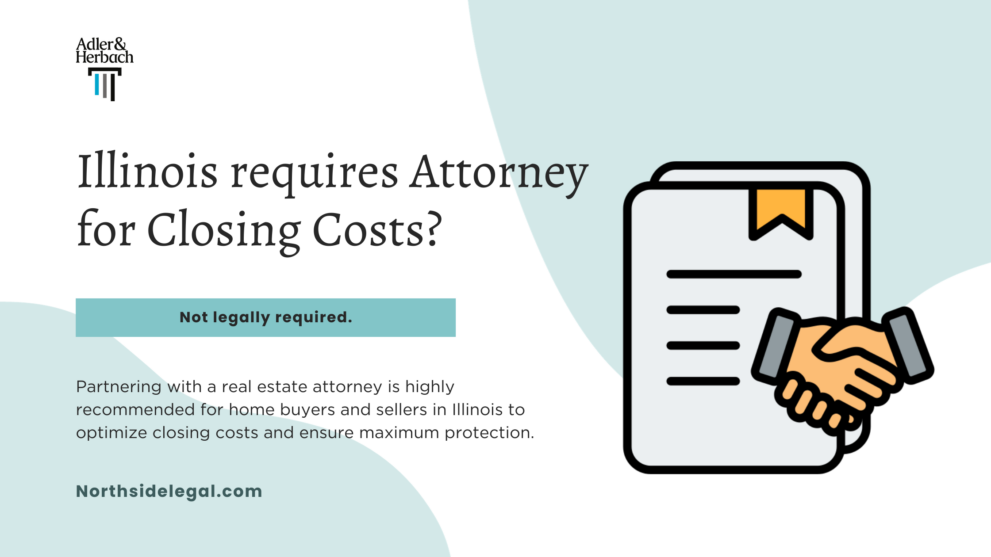During a real estate transaction, both home buyers and sellers have to pay closing costs – fees charged to process the property’s ownership transfer. When you’re budgeting for these expenses, an important question arises – does Illinois require you to have an attorney handle the closing costs?
Does Illinois Require an Attorney for Closing Costs?
Unlike some East Coast states, Illinois does not legally require a real estate attorney to oversee residential real estate closings or the closing costs associated with it. Hiring legal counsel is technically optional for buyers and sellers in Illinois.

However, just because the law doesn’t require it does not mean an attorney shouldn’t be strongly considered. Their expertise can help optimize the closing process, prevent any surprises, and safeguard your financial interests.
Why Illinois Home Buyers & Sellers Often Hire a Lawyer at Closing?
In Illinois, home buyers and sellers utilize a lawyer at closing for their contract expertise, superior negotiation skills, and effective dispute resolution. Lawyers offer robust title expertise ensuring that clean, valid ownership rights are transferred. They ensure smooth closings by maintaining custom and compliance, spotting potential issues and breaking down complex matters so the parties can close with ease and peace of mind.
1. Contract Expertise
Real estate attorneys have extensive knowledge surrounding property laws, regulations, and contracts in Illinois. They use their experience to ensure all sales agreements and terms protect the client’s interests and are fully compliant. Without legal training, buyers and sellers may overlook clauses that could negatively impact them down the road.
2. Negotiation Skills
Skilled real estate lawyers are able to negotiate contract terms and conditions to serve the best interest of their clients. They know where a buyer’s offers or seller counter-offer can be strategically improved while still having a high chance of acceptance. Attorneys serve as strong advocates.
3. Dispute Resolution
During a transaction, various disputes can pop up between parties that threaten to derail the deal. These often involve inspection issues, title concerns like liens, appraisal values, modification requests, delays, and much more. Savvy real estate attorneys are able to resolve a majority of disputes, keeping the deal on track.
4. Title Expertise
Real estate lawyers, unlike most escrow companies, have specialized legal education surrounding title searching, insurance, ownership disputes, and lien removal. They thoroughly review title to ensure clients are receiving clean, valid ownership rights free of defects or encumbrances. Missed title issues could result in future claims against the property.
5. Closing Oversight
From start to finish, real estate attorneys keep close tabs on the closing process to ensure compliance with laws, regulations and customs. They review paperwork, disclosures, title commitments, policies, and transfer documents to catch errors and prevent issues post-closing. Lawyers catch common mistakes that clients may easily overlook.
6. Explanations of Complex Issues
For novice home buyers, the stack of loan documents and disclaimers at closing can be mind-boggling. Experienced real estate lawyers take the time to explain mortgage clauses, title policies, tax implications, disclosures and the various settlement fees item by item, allowing clients to close with confidence.
Is it Worth it to Hire a Real Estate Attorney Just for the Closing Process?
Hiring a real estate attorney for the closing process can be beneficial. They ensure accurate calculation of closing costs, negotiate title insurance fees, resolve disputes, and prevent leakage of unauthorized fees. Their expert oversight could save you a considerable amount of money.
Here are some of the top ways having a real estate attorney handle your side of the closing costs can make the process smoother and minimize financial risks:
- Reviewing the closing documents to ensure closing costs are calculated correctly without errors or discrepancies.
- Negotiating title insurance pricing and other aspects to optimize closing costs for their client.
- Providing transparency on closing fees so there are no surprises for buyers/sellers at the closing table.
- Checking for any unauthorized or excessive fees.
- Answering client questions on the various closing fees itemized in their closing disclosure paperwork.
- Resolving any closing cost disputes that arise between parties to the transaction.
- Overseeing the escrow and ensuring disbursement of closing costs adheres to the purchase contract terms and custom.
- Catching and correcting any potential closing cost mistakes before final documents get signed and submitted.
Without experienced legal insight, it’s possible for excess closing costs, errors, or misaligned fees to slip through the cracks – costing you money in the process.
Typical Illinois Closing Costs for Buyers vs. Sellers
While closing fees can vary case by case, here is an overview of the typical closing costs paid by home buyers and sellers in Illinois:
1. Buyer’s closing costs may include:
- Lender origination fees and points
- Appraisal and credit report fees
- Loan title insurance premiums
- Escrow payments
- Attorney fees
- Inspection costs
- Homeowner’s insurance
- Transfer taxes
- Recording charges
2. Seller’s closing costs often include:
- Real estate agent commissions
- Attorney fees
- Title search costs
- Title insurance premiums
- Transfer taxes
- State/County tax stamps
- Payoff of any outstanding liens
- Property tax prorations
- HOA fees
The seller traditionally covers the real estate agent commissions, which are typically the largest expense, usually between 5-6% of the sale price. But each party can expect to pay roughly 1-3% of the purchase price in other closing fees.
Learn more about
Bottom Line
In summary, Illinois state law does not require you to have a real estate attorney handle your side of the closing costs and fees as a home buyer or seller. However, for maximum protection, legal expertise optimizing your closing costs is highly recommended. Partnering with the right real estate lawyer ensures you pay only mandatory closing fees and saves you money long term.


